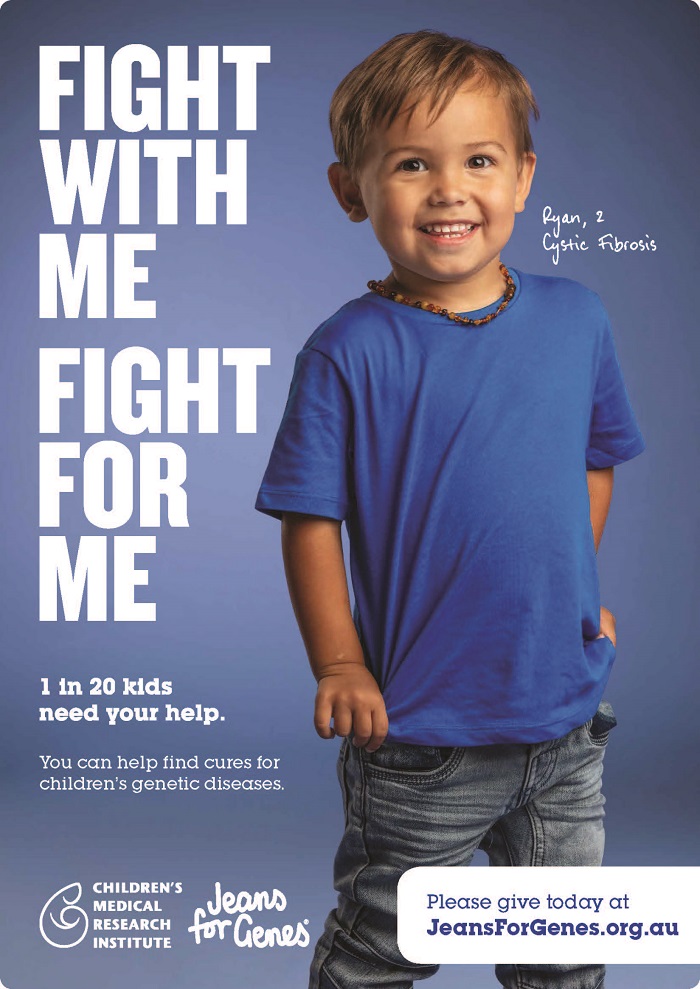
This coming 2 August 2019, the Children’s Medical Research Institute will celebrate Jeans for Genes, a yearly fundraising campaign to fund revolutionary research that helps diagnose, understand and find cures or treatments for conditions affecting kids, including genetic diseases, cancer, and epilepsy.
Established in 1994, Jeans for Genes has helped CMRI achieve the following:
- Established an ongoing "vector" engineering program that is designing new ways to cure many genetic diseases using gene therapy
- Discovered a cure for genetic liver disease, with clinical trials about to begin
- Partnered with The Children’s Hospital at Westmead on the first-ever gene therapy clinical trial in Australia, which corrected SCIDX1-deficiency (boy in the bubble disease)
- Found a single genetic defect can cause cleft lip and palate
- Discovered dozens of genes causing blindness and introduced genetic testing for these and other conditions, so families can be counselled
- Genetic identification of previously uncharacterised types of aplastic anaemia, which now helps children and teens survive bone marrow transplant to treat the disease
- Discovered a new class of drugs to treat the 1 in 3 epileptics not helped by current medication (now in pre-clinical trials)
- Launched a world-first project to revolutionise cancer diagnosis and personalise treatment planning
Who is CMRI?
The Children's Medical Research Institute (CMRI) is an Australian-based independent medical research institute that conducts research into the fundamental causes of disease. Starting 2014, research has been focused on the causes of cancer, epilepsy and birth defects.
Founded in 1958 by paediatricians Sir Lorimer Dods, Dr John Fulton and Douglas Burrows, honorary treasurer and later president of the Royal Alexandra Hospital for Children, CMRI aims to "perform scientific research with a commitment to better treat, and where possible, prevent childhood illness and disability so that all concerned have a better quality of life".
What is a genetic disease?
Genetic diseases are one of the leading causes of death in children under four and the main cause of ongoing hospitalisation. Recent statistics have shown that 1 in 20 kids is born with a genetic disease or birth defect. This means that someone you know and care about is likely affected with this condition.
A genetic disease is any disease caused by an abnormality in the genetic makeup of an individual. The genetic abnormality can range from minuscule to major - from a discrete mutation in a single base in the DNA of a single gene to a gross chromosome abnormality involving the addition or subtraction of an entire chromosome or set of chromosomes. Some people inherit genetic disorders from the parents, while acquired changes or mutations in a preexisting gene or group of genes cause other genetic diseases. Mutations can occur either randomly or due to some environmental exposure.
There are four types of genetic disorders that are inherited:
- Single gene inheritance - Also called Mendelian or monogenetic inheritance. Changes or mutations that occur in the DNA sequence of a single gene cause this type of inheritance. There are thousands of known single-gene disorders. These disorders are known as monogenetic disorders or disorders of a single gene.
- Multifactorial inheritance - Also called complex or polygenic inheritance. Inherritance disorders of this type are caused by a combination of environmental factors and mutations in multiple genes. For example, different genes that influence breast cancer susceptibility have been found on chromosomes 6, 11, 13, 14, 15, 17, and 22. Some common chronic diseases are multifactorial disorders.
- Chromosome abnormalities - Chromosomes, distinct structures made up of DNA and protein, are located in the nucleus of each cell. Because chromosomes are the carriers of the genetic material, abnormalities in chromosome number or structure can result in disease. Abnormalities in chromosomes typically occur due to a problem with cell division.
- Mitochondrial inheritance - This type of genetic disorder is caused by mutations in the non-nuclear DNA of mitochondria. Mitochondria are small round or rod-like organelles that are involved in cellular respiration and found in the cytoplasm of plant and animal cells. Each mitochondrion may contain 5 to 10 circular pieces of DNA. Since egg cells, but not sperm cells, keep their mitochondria during fertilization, mitochondrial DNA is always inherited from the female parent.
To fight this epidemic, more research is important.
How can you help?
You can help the work being done at Children's Medical Research Institute by signing up to raise funds or sell merchandise, by volunteering, or by donating. You can do any of these and learn mor by visiting this website.

|
Do you have a natural health & wellness business? |









